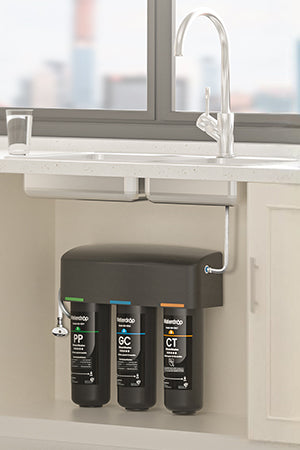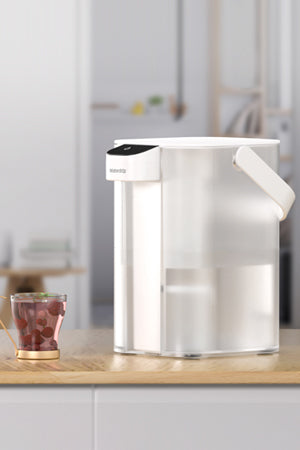When it comes to safe drinking water in Singapore, lots of people question whether or not they actually need a home water filter. Singapore’s tap water comes and goes as one of the purest throughout Asia, after all.
But is it pure enough to be consumed straight from the faucet, or is it worth spending your cash on one anyway? In this article, we will tackle the usual questions Singaporeans have regarding tap water, describe the function of filters, and let you determine for yourself if a tap water filter is a worthwhile selection for your home.
Can You Drink Tap Water in Singapore?
Indeed, the Singapore tap water meets
the World Health Organization (WHO) quality standards for potable water.
PUB (Public Utilities Board) , the national water utility, treats and analyzes the water systematically to make it pure and clean.
However, though the effluents released through the plants are clean, along the way they may pick up impurities. Outdated water mains, plumbing system within dwelling units, and storage facilities within buildings sometimes introduce impurities. That is the reason why the majority of households in Singapore like installing a tap water filter as an extra measure of protection.
What is there in the tap water of Singapore?
Although the tap water for Singapore is safe on the international scale, it can consist of minute amounts of the following:
- Chlorine – employed for disinfection purposes but can alter taste and odour.
- Rust or sediment -- from aged tank storage structures and pipes.
-
Microplastics – trace amounts can still be present in tap water.
- Heavy metals – possibility in older dwellings whose plumbing is faulty.
In the situation of sensitive populations such as infants, expectant women, or immunocompromised persons, such contaminants can be problematic. That is where a filtration system for tap water comes into play.
How Do Tap Water Filters Work?
A kitchen tap water filter is a system that removes or reduces unwanted items from your kitchen tap water. Different filters use different technologies, for instance:
- Activated Carbon Filters – eliminate chlorine, odors, and organic compounds that affect flavor.
-
RO Systems (Reverse Osmosis) - Eliminate dissolved solids, heavy metals, and up to 99% of impurities.
- UV Filters – kill bacteria and viruses with ultraviolet light.
- Sediment Filters – trap dust, sand, and rust particles.
With the integration of these technologies, a quality water filter can make your kitchen tap water pure, safe, and more palatable.
Can a Tap Water Filter Work in Singapore?
The short answer is: Yes, it is effective to use a tap water filter. Although the tap water of Singapore is safe by default, filters add another level of protection and make the overall drinking experience better.
That is why Singaporeans typically install a home water filtration system:
- Improved Taste and Smell – filters remove chlorine, making the water healthier and tastier.
- Extra Coverage – against heavy metals, sediments, and microplastics.
- Health Benefits – safer potable water for children, the elderly, and expectant women.
- Convenience – filtered water through your tap eliminates the need to boil your water or buy bottled water.
Do I Still Need to Boil Water if I Have a Water Filter?
Boiling can destroy viruses and bacteria, but will not remove chlorine, heavy metals, or microplastics. If you are dealing with a decent-quality tap water filter, boiling will normally not be necessary for daily drinking.
However, if you are unsure about your building’s plumbing system or water tank hygiene, boiling filtered water can add another safety layer, especially when preparing baby formula.
What kind of water filtration system should you use in Singapore?
Selecting the proper water filtration system relies upon your needs, budget, and lifestyle. Let’s consider some of the most common types:
1. Faucet-Mounted Filter
- Can be fitted straight on your faucet.
- Affordable and convenient.
- Small households only.
2. Countertop Water Filters
- Provide stronger filtration.
- Some models incorporate reverse osmosis for total purity.
- Ideal for families who require safeguarded drinking water daily.
3. Under-Sink Water Filters
- Installed under the kitchen sink.
- Provide continuous, high-quality filtered water.
- Saves countertop space.
4. Whole-House Water Filters
- Treat the entire house's water.
- Ideal for homes with old piping or water tanks.
- More expensive but offers full coverage.
Why Do Most Singaporeans Prefer Waterdrop Water Filters?
When you discuss tap water filters for Singapore, there is one company you can rely on, and it is Waterdrop. Here’s why:
- Advanced Water Filtration Technology – Waterdrop filters use multi-stage filtering, like activated carbon and reverse osmosis, and can remove up to 99% of impurities. Makes You Taste Better – not you, though; the water.
- Space-Efficient Design – especially the Waterdrop under-sink and countertop slim designs, best suited for Singapore’s compact kitchens.
- Easy Installation – no professional plumber needed for most models.
- Eco-Friendly – reduces plastic waste from bottled water.
For example,
Waterdrop Reverse Osmosis Hot Cold Water Dispenser, A2 is one of the favorite home solutions for people living in Singapore. It offers high output, high-quality filtration, and tankless setup for compact storage.
People Also Asked Questions
1. Does a Singaporean need a tap water filtration system?
Yes. Even though tap water is safe, a filter provides extra protection and good-tasting water, especially for families with children or older people.
2. Does a tap water filter remove chlorine?
Indeed, the vast majority of filters—particularly activated-carbon filters—will eliminate the chlorine, leaving your water tasting cleaner.
3. How frequently should I replace the filters?
Varies with use and filter type. Typically, faucet filters last for 2–3 months and reverse osmosis filters for 6–12 months.
4. Does a tap water filter kill bacteria?
Some filters can, but not all. To be properly protected, choose a system with RO membranes or UV sterilization.
5. Is bottled water safer compared to filtered tap water in Singapore?
Not quite. With a proper filtration system, your filtered tap water can be just as clean—and possibly cleaner—than bottled water. Plus, it’s more cost-effective and sustainable.
Why a Water Filter for Singapore May Be Justifiable?
Even though the tap water in Singapore is pure and safe for consumption, a tap filtration system offers added defense and enhanced quality and taste. For households with babies, older relatives, or individuals who are sensitive to chlorine and other impurities, the addition of a filtration system is a worthwhile investment.
Brands like Waterdrop provide high-quality and efficient filtration for water that can suit the lifestyle of Singapore. You can acquire anything ranging from a simple faucet filter up through small-sized counter-top systems or under-sink RO systems that can provide what you need for your dwelling. Investing in a quality water filtration system provides peace of mind and healthier tap water for your family—right from your faucet.





































































